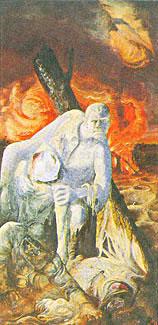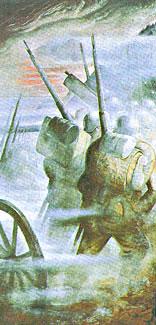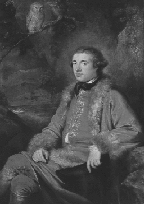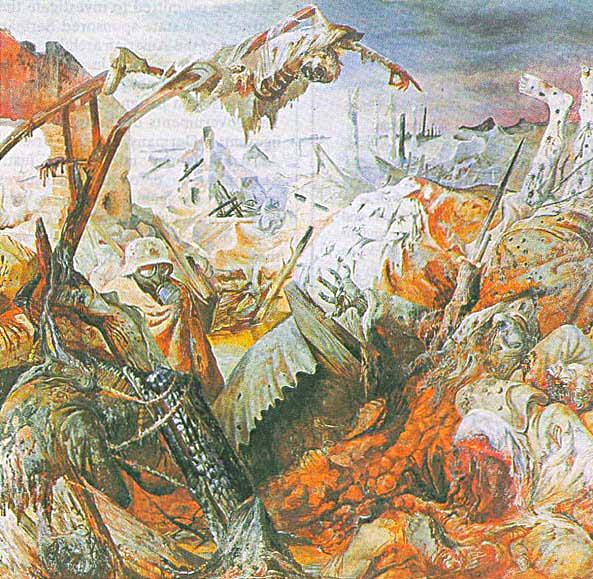hile viewing, as travelers usually do, the remarkable objects of curiosity at Venice, I was conducted through the different departments of the Arsenal; and as I contemplated the great storehouse of mortal engines, in which there is not only a large deposit of arms, but men are continually employed in making more, my thoughts rebounded, if I may use the expression, from what I beheld; and the effect was, that I was first as it were stunned into a state of amazement, and when I recovered from that, my mind expanded itself in reflections upon the horrid irrationality of war.
What those reflections were I do not precisely recollect. But the general impression dwells upon my memory; and however strange it may seem, my opinion of the irrationality of war is still associated with the Arsenal of Venice.
One particular however I well remember. When I saw workingmen engaged with grave assiduity in fashioning weapons of death, I was struck with wonder at the shortsightedness, the caecae mentes of human beings, who were thus soberly preparing the instruments of destruction of their own species. I have since found upon a closer study of man, that my wonder might have been spared; because there are very few men whose minds are sufficiently enlarged to comprehend universal or even extensive good. The views of most individuals are limited to their own happiness; and the workmen whom I beheld so busy in the Arsenal of Venice saw nothing but what was good in the labour for which they received such wages as procured them the comforts of life. That their immediate satisfaction was not hindered by a view of the remote consequential and contingent evils for which alone their labours could be at all useful, would not surprise one who has had a tolerable share of experience in life. We must have the telescope of philosophy to make us perceive distant ills; nay, we know that there are individuals of our species to whom the immediate misery of others is nothing in comparison with their own advantage -- for we know that in every age there have been found men very willing to perform the office of executioner ever for a moderate hire.
To prepare instruments for the destruction of our species at large, is what I now see may very well be done by ordinary men, without starting, when they themselves are to run no risk. But I shall never forget, nor cease to wonder at a most extraordinary instance of thoughtless intrepidity which I had related to me by a cousin of mine, now a lieutenant-colonel in the British army, who was upon guard when it happened. A soldier of one of the regiments in garrison at Minorca, having been found guilty of a capital crime, was brought out to be hanged. They had neglected to have a rope in readiness, and the shocking business was at a stand. The fellow, with a spirit and alertness which in general would, upon a difficult and trying emergency, have been very great presence of mind and conduct, striped the lace off his hat, said this will do, and actually made it serve as the fatal chord.
The irrationality of war is, I suppose, admitted by almost all men: I almost say all; because I have met myself with men who attempted seriously to maintain that it is an agreeable occupation and one of the chief means of human happiness. I must own that although I use the plural number here, I should have used the dual, had I been writing in Greek; for I never met with but two men who supported such a paradox; and one of them was a tragick poet, and one a Scotch Highlander. The first had his imagination so in a blaze with heroic sentiments, with the 'pride, pomp, and circumstance of glorious war,' that he did not avert to its miseries, as one dazzled with the pageantry of a magnificent funeral thinks not of the pangs of dissolution and the dismal corpse. The second had his attention so eagerly fixed on the advantage which accrued to his clan from the 'trade of war,' that he could think only of it as a good.
We are told by some writers, who assume the character of philosophers, that war is necessary to take off the superfluity of the human species, or at least to rid the world of numbers of idle and profligate men who are a burden upon every community, and would grow an insupportable burden, were they to live as long as men do in the usual course of nature. But there is unquestioningly no reason to fear a superfluity of mankind, when we know that although perhaps the time 'when every rood of land maintain'd its man' is a poetical exaggeration, yet vigorous and well directed industry can raise sustenance for such a proportion of people in a certain space of territory, as is astonishing to us who are accustomed to see only moderate effects of labour; and when we also know what immense regions of the terrestrial globe in very good climates are uninhabited. In these there is room for millions to enjoy existence. In cultivating these, the idle and profligate, expelled from their original societies, might be employed and gradually reformed, which would be better surely, than continuing the practice of periodical destruction, which is also indiscriminate, and involves the best equally with the worst of men.
I have often thought that if war should cease over all the face of the earth, for a thousand years, its reality would not be believed at such a distance of time, notwithstanding the faith of authentick records in every nation. Were mankind totally free from every tincture of prejudice in favour of those gallant exertions which could not exist were there not the evil of violence to combat; had they never seen in their own days, or been told by father or grandfathers, of battles, and were there no traces of the art of war, I have no doubt that they would treat as fabulous or allegorical, the accounts in history, of prodigious armies being formed, of men who engaged themselves for an unlimited time, under the penalty of immediate death, to obey implicitly the orders of commanders to whom they not attached either by affection or by interest; that these armies were sometimes led with toilsome expedition over vast tracts of land, sometimes crouded into ships, and obliged to endure tedious, unhealthy, and perilous voyages; and that the purpose of al this toil and danger was not to obtain any comfort or pleasure, but to be in a situation to encounter other armies; and that those opposite multitudes the individuals of which had no cause to quarrel, no ill-will to each other, continued for hours engaged with patient and obstinate perseverance, while thousands were slain, and thousands crushed and mangled by the diversity of wounds.
We who have from our earliest years had our minds filled with scenes of war of which we have read in the books that we most revere and most admire, who have remarked it in every revolving century, and in every country that has been discovered by navigators, even in the gentle and benign regions of the southern oceans; we who have seen all the intelligence, power and ingenuity of our nation employed in war, who have been accustomed to peruse Gazettes, and have had our friends and relations killed or sent home to us wretchedly maimed; we cannot without a steady effort of reflection be sensible of the improbability that rational creatures should act so irrationally as to unite in deliberate plans, which must certainly produce the direful effects which was is known to do. But I have no doubt that if the project for a perpetual peace which the Abbé de St Pierre sketched, and Rousseau improved, were to take place, the incredulity of war would after the lapse of some ages be universal.
Were there any good produced by war which could in any degree compensate its direful effects; were better men to spring up from the ruins of those who fall in battle, as more beautiful material forms sometimes arise from the ashes of others; or were those who escape from its destruction to have an increase of happiness; in short, were there any great beneficial effect to follow it, the notion of its irrationality would be only the notion of narrow comprehension. But we find that war is followed by no general good whatever. The power, the glory, or the wealth of a very few may be enlarged. But the people in general, upon both sides, after all the sufferings are passed, pursue their ordinary occupations, with no difference from their former state. The evils therefore of war, upon a general view of humanity are as the French say, à pure perte, a mere loss without any advantage, unless indeed furnishing subjects for history, poetry, and painting. And although it should be allowed that mankind have gained enjoyment in these respects, I suppose it will not be seriously said, that the misery is overbalanced. At any rate, there is already such a store of subjects, that an addition to them would be dearly purchased by more wars.
I am none of those who would set up their notions against the opinion of the world; on the contrary, I have such a respect for that authority, as to doubt my own judgement when it opposes that of numbers probably as wise as I am. But when I maintain the irrationality of war, I am not contradicting the opinion, but the practice of the world. For, as I have already observed, its irrationality is generally admitted. Horace calls Hannibal, demens, a madman; and Pope gives the same appellation to Alexander the Great and Charles XII:





 Back to Voltaire and War Page
Back to Voltaire and War Page